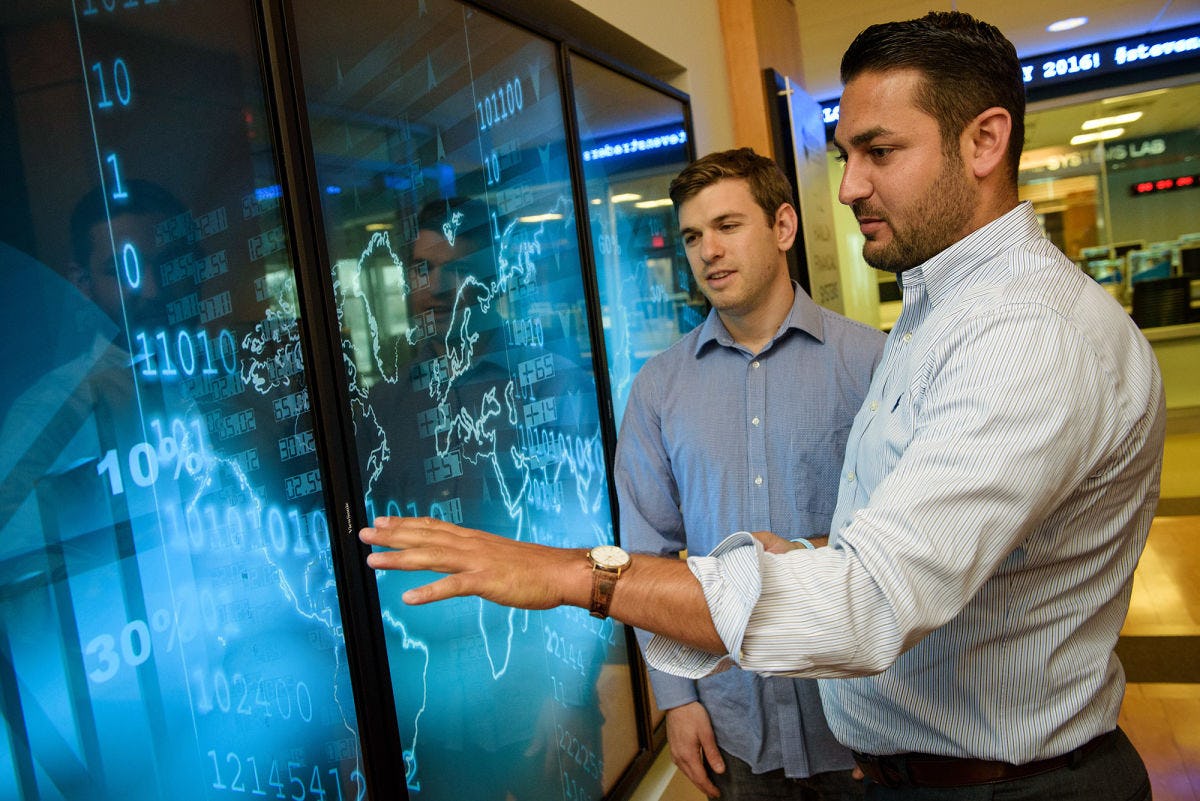Become a thought leader in some of the hottest topics in business and science
A unique blueprint for aspiring data scientists
Given the rapid evolution of emerging A.I. concepts like machine learning and language processing, Stevens worked with industry to develop four curricular threads that ensure mastery of the most important principles in this discipline. These areas represent the greatest needs for tomorrow’s data scientist.
Machine learning and artificial intelligence. Explores statistical learning, A.I., machine learning and financial analytics.
Mathematical and statistical modeling. Covers multivariate analytics, financial time series and dynamic programming techniques.
Computational systems. Explores advanced algorithm design, distributed systems and cloud technologies.
Data management at scale. A deeper dive into data technologies, mobile systems and data management.
At Stevens, the interdisciplinary Ph.D. in Data Science prepares inquisitive students to become pioneers in this space through a rigorous curriculum emphasizing mathematical and statistical modeling, machine learning, computational systems and data management. The program is administered through both the Schaefer School of Engineering and Science and the School of Business at Stevens, ensuring a diverse curriculum that responds to demand for data scientists with extensive knowledge of the theories, techniques and applications associated with data and artificial intelligence. Graduates become research leaders in academia or industry, where they lead the organization’s forays through the data revolution and into the age of A.I. and machine learning.
Who should apply
The Ph.D. in Data Science is a full-time program offered on the Stevens campus in Hoboken, NJ. Applicants must have technical backgrounds — either a master’s degree in a field like computer science or business analytics, or relevant work experience. The program has a strong practical research component, so students will need the intellectual curiosity to do important research alongside Stevens faculty who are breaking new ground in theory and application of data science.
Admission requirements
Admission to the Ph.D. in Data Science is a highly competitive. Classes and research projects explore high-tech concepts in great depth, so only technically oriented students with the highest academic credentials will be admitted.
A list of Stevens admissions criteria is available at Graduate Admissions. Some specialized requirements for entry into this program include:
An excellent GMAT or GRE score.
Prerequisite courses in calculus, statistics, probability, algebra and database management.
Fluency in at least one programming language, like C++ or Java.
For international students: An excellent TOEFL or IELTS score.
A master's program in a technical discipline is a requirement for the program, although outstanding candidates with bachelor's degrees will be considered, as well. At Stevens, degree programs like those in Business Intelligence & Analytics, Computer Science, Financial Analytics, Financial Engineering, Biomedical Engineering and Chemical Biology are excellent preparation for the Data Science doctoral program.
Relevant work experience will be factored into an admissions decision, but is not a requirement for entry to this program.
Curriculum includes:
mathematical and statistical modeling
machine learning and artificial intelligence
data management at scale
computational systems
concentrations in either financial services or life sciences
High-tech labs power impactful research
To be a thought leader, you must be an excellent researcher. At Stevens, you'll work with faculty in high-tech labs to prepare you for career success.
The Hanlon Center
The Hanlon Financial Systems Center offers the same technology used by major Wall Street firms. Analyze and visualize large datasets in real-time to make better-informed decision making.
CRAFT
Joining forces with the National Science Foundation and the Rensselaer Polytechnic Institute, Stevens has established CRAFT, the Center for Research toward Advancing Financial Technologies. The center dives into research on AI, cryptocurrencies, decentralized finance, quantum computing, cybersecurity and many other technologies affecting the fintech industry.
Institute for AI
The Stevens Institute for Artificial Intelligence (SIAI) is an interdisciplinary, tech-driven collaboration of engineering, business, systems and design experts working toward solving pressing global problems in industry and the world.
Computational Systems Biology Laboratory
Work at the Computational Systems Biology Lab involves modeling biological systems in the study of complex systems with diverse elements.
10 Minutes to NYC
Located across the Hudson River from Manhattan, Stevens students enjoy all the big city benefits of NYC while being in the intimate setting of Hoboken, NJ.
Internship Opportunities - Meet hiring managers from every industry.
Successful Alumni - Join a network of Stevens grads now working in top-tier companies like Amazon, BlackRock, Deloitte, EY, JP Morgan Chase, and many others.
World-class cultural amenities - Broadway, museums, concerts, fashion, restaurants and endless more that make living here so interesting
Practical Emphasis
Owing to its legacy as an engineering school, Ph.D. programs at Stevens are unique for practical coursework and research aims. Whether students seek careers in industry or academia, a track record of practical studies prepares you to do work that creates visible impact.
Interdisciplinary approach
The Data Science program blends the theory and design of computation — a specialty of the Schaefer School of Engineering and Science — with the data analysis and statistical techniques of the School of Business. It’s a one-of-a-kind combination that will give you new perspectives on artificial intelligence.
Financial Support
All doctoral students are fully supported by teaching and research assistantships that include competitive stipends, tuition and health benefits. This ensures students have the resources to fully dedicate themselves to their scholarly pursuits.


